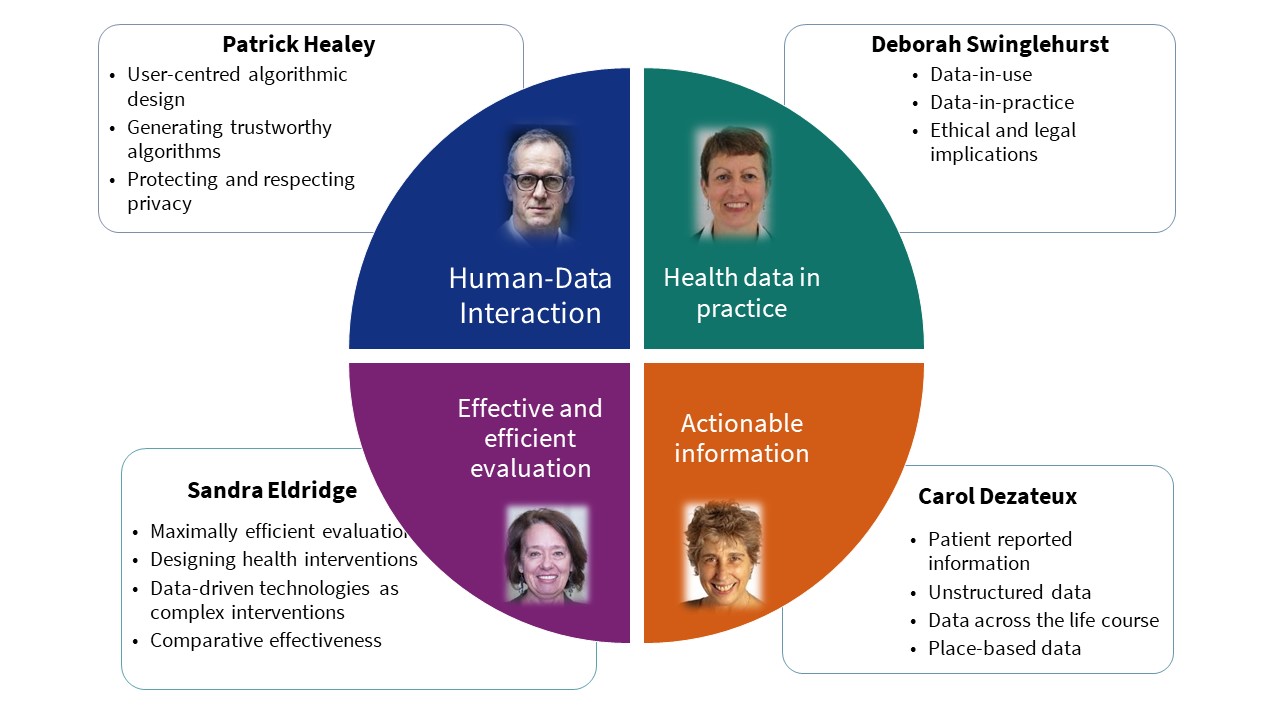Patient reported information
- Exploration of novel sensing techniques (including wearables) for capturing new data on patient-collected or reported outcomes relevant to social health and wellbeing.
Unstructured data
- Use of advanced sensing and natural language processing techniques to capitalise on the potential of unstructured datasets which contain rich information on patient symptoms and experiences.
Data across the life course
- Novel approaches to using health data across the life course to develop disease classifications from all available information on health states and traits, including multiple long-term conditions.
Place-based data
- Scaleable innovations in methods to identify and link communities and households to individual-level health data and their application to assess geospatial aspects of the built and wider environment, and to design and evaluate cluster-based interventions and natural experiments.
Maximally efficient evaluation
- Novel designs to maximise the use of health data to provide meaningful answers to important health and health service-related questions relevant to the effectiveness, cost-effectiveness and safety of interventions, including novel approaches to defining minimally sufficient data for evaluation.
Designing health interventions
- Understanding how cluster randomised trials, stepped wedge and other efficient designs can be used to evaluate the effectiveness and cost-effectiveness of technologies using health data, including emerging designs such as ‘trials within cohorts’ and routine data and individual- level interrupted time series.
Data-driven technologies as complex interventions
- Applying qualitative methods to develop, pilot, evaluate and implement complex interventions using algorithms derived from health data.
- Understanding the ethical and regulatory frameworks as applied to these technologies.
Comparative effectiveness
- Methodological approaches to assessing effectiveness based on time-varying observational health data and approaches to minimise bias.
Lead: Deborah Swinglehurst
Data-in-use
- Understanding how social, organisational and institutional context shapes the production, collection and interpretation of data, and with what consequences, for the nature of ‘data’ and its contribution to health care delivery and improvement. This stream will adopt a sociotechnical lens with a focus on ‘data-in-use’.
Data-in-practice
- Understanding how health care professionals produce explanations and what users - including patients, their carers, and health care professionals - find useful.
- Using ethnographic approaches, as well as computational analyses of spoken and written communications, to understand the perspectives of practitioners, patients and their carers, to improve safety, inform health care interactions, and improve decision-making, including that informed by algorithms.
Ethical and Legal Implications
- Research on the legal, ethical and governance implications of data-in-use, AI and relevant health care recommendations.
User-centred algorithmic design
- Exploring potential interpretation and uses of health data by different user constituencies including, researchers, patients, clinicians, policy makers, carers.
- Development of simple, actionable, user-centred representations of algorithmic analyses for health care professionals, patients and carers, and the public.
Generating trustworthy algorithms
- Developing computational techniques for exposing and testing the rationale behind algorithmic recommendations.
- Development of AI architectures that can generate and adjust explanations to individuals and enhance intelligibility and explainability.
- Methods to mitigate algorithmic biases and evaluate algorithmic reproducibility.
Protecting and Respecting Privacy
- Methods for increasing the liquidity of health data without compromising privacy, analyses of different group’s perceptions of privacy, development of privacy preserving infrastructure eg differential privacy.
